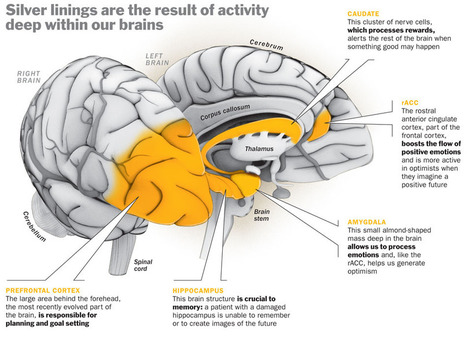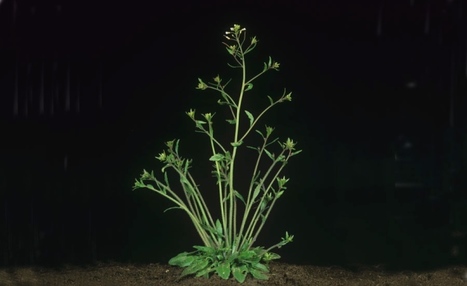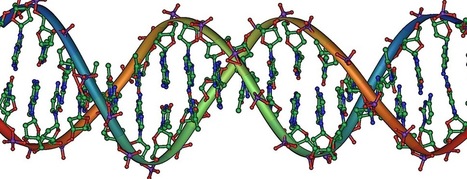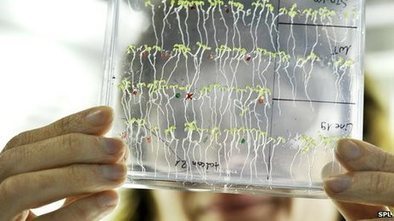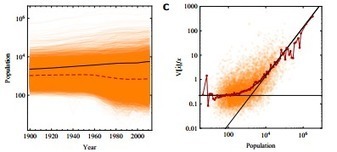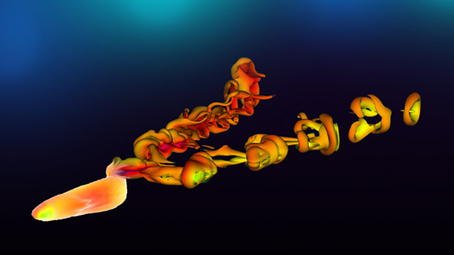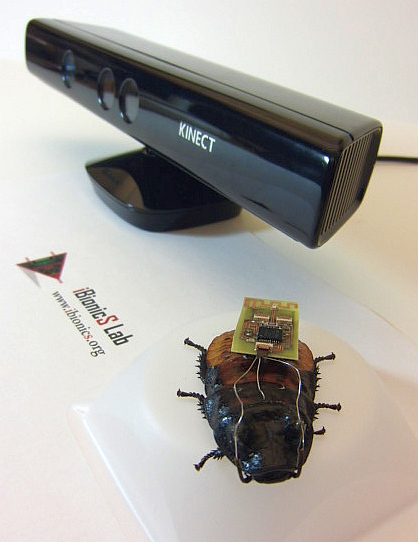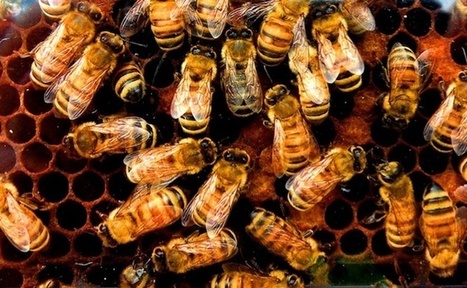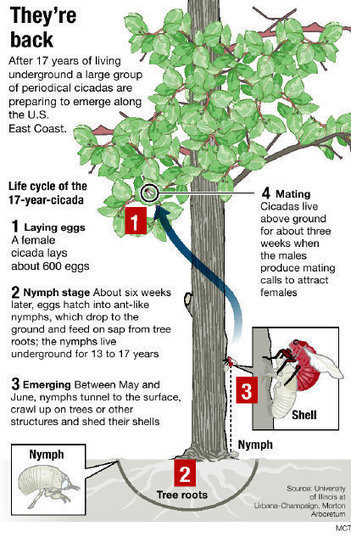
|
Scooped by
Sakis Koukouvis
onto Science News January 29, 2012 1:52 PM
|
Get Started for FREE
Sign up with Facebook Sign up with X
I don't have a Facebook or a X account


 Your new post is loading... Your new post is loading...
 Your new post is loading... Your new post is loading...
|

|
Scooped by
Sakis Koukouvis
June 30, 2013 7:31 AM
|
Applause spreads linearly, like a disease. The amount of time an individual feels like clapping is a factor, but not nearly as much as peer pressure.
This is interesting, how peer pressure can factor into little things. Would be good to see what makes the brain do these things and what chemical reactions occure.
-Tanah

|
Scooped by
Sakis Koukouvis
June 30, 2013 7:08 AM
|
Here’s another reason to love cicadas: A new study has found that tiny structures on cicada wings can kill bacteria through physical and not chemical means.

Interesting, could lead to some very important discoveries in future

Antibiotic resistance is nothing new; it is a very real threat in the world today. Bacteria are mutating and resisting our best tools at a rate that modern scientists can't keep up with. They say you learn something new everyday, and this was something I had no idea about until now! I flocked to this article because it is definitely an interesting concept. What is even cooler is the fact that a cicada's wings are able to kill gram-negative bacteria (gram-positive aren't affected), such as E. coli, through physical means and not chemical. This means the bacteria are unlikely to become resistant to the affects! Just imagine the ways scientists can utilize this!
This article, while not a scientific report, references the study done by scientists and provides links to it, therefore making the article a reliable source of information.

|
Scooped by
Sakis Koukouvis
June 30, 2013 7:05 AM
|
Simulations show that you can learn the meaning of words rapidly if you assume that every object has only one word associated with it.
This helps greatly with language students here at rhodes. Find out what is the difference between this learning style and the ordinary ones and what ordinary language learning styles are.
-Tanah

I saw this a while ago and forgot about it. It is not a method towards perfect language learning but it is a route to sufficient language learning.

|
Scooped by
Sakis Koukouvis
June 30, 2013 6:58 AM
|
Arithmetic division guides plants' use of energy at night.
As if making food from light were not impressive enough, it may be time to add another advanced skill to the botanical repertoire: the ability to perform — at least at the molecular level — arithmetic division.
This is an interesting science piece. You can research how this happens and whether research is going into learning how to replicate this in other objets.
-Tanah

|
Scooped by
Sakis Koukouvis
June 30, 2013 6:53 AM
|
One of the great triumphs of twentieth-century biology was the discovery of how genes make proteins. Genes are encoded in DNA. To turn the sequence of a gene into a protein, a number of molecules g...

|
Scooped by
Sakis Koukouvis
June 30, 2013 6:40 AM
|
Modern sleep patterns cause ill health, so it is time to work out how much rest we really need.

|
Scooped by
Sakis Koukouvis
June 30, 2013 6:29 AM
|
Humans are able to throw projectiles at incredible speeds. Findings from a recent study are providing new insights on the mechanics and evolution of this human trait.

|
Scooped by
Sakis Koukouvis
June 30, 2013 6:19 AM
|
Satellite images show noctilucent clouds in Earth’s upper atmosphere, centered on the North Pole.

|
Suggested by
The BioSync Team
June 29, 2013 2:43 PM
|
Scientists crack the code of mammalian breathing.

|
Suggested by
The BioSync Team
June 29, 2013 2:43 PM
|
Plants have a built-in capacity to do maths, which helps them regulate food reserves in the night, say UK scientists.

|
Suggested by
The BioSync Team
June 13, 2013 4:58 PM
|
Ice shelves lose more mass through melting where the ice meets the sea than by shedding icebergs, a new study says.

|
Scooped by
Sakis Koukouvis
June 30, 2013 7:14 AM
|
The discovery of a law governing the growth of cities means that future urban populations can now be forecast in advance

Based on Hernando, A., Hernando, R. and Plastono, A. (2013) Space-time correlation in urban sprawl. Available at: arXiv:1306.3656

|
Scooped by
Sakis Koukouvis
June 30, 2013 7:07 AM
|
Features of Saturn's Great White Spot as small as 14 km were imaged.

|
Scooped by
Sakis Koukouvis
June 30, 2013 7:03 AM
|
Some had dismissed the unknown script in a mysterious 15th-century illustrated text as gibberish, but statistical analysis indicates it could be a cipher

|
Scooped by
Sakis Koukouvis
June 30, 2013 6:57 AM
|
Researchers have revealed some of the mechanical properties that allow undulatory fish to move so intricately, including vorticity (shown above), the rotational velocity of the fluid in the wake of the swimming fish.

|
Scooped by
Sakis Koukouvis
June 30, 2013 6:45 AM
|
The future of Facebook in our lives seems long-term. Facebook reports 1.11 billion monthly active users as of March 2013. That’s a lot of information being passed back and forth, a lot to absorb and respond to, and a lot to curate. As such, more people may find themselves taking a break from daily engagement with the site—sometimes you just need a break from Candy Crush Saga requests.

|
Scooped by
Sakis Koukouvis
June 30, 2013 6:35 AM
|
North Carolina State University researchers are using video game technology to remotely control cockroaches on autopilot, with a computer steering the cockroach through a controlled environment. The researchers are using the technology to track how roaches respond to the remote control, with the goal of developing ways that roaches on autopilot can be used to map dynamic environments – such as collapsed buildings.

|
Scooped by
Sakis Koukouvis
June 30, 2013 6:24 AM
|
The explanation of the mysterious barren circles that form in the middle of fertile grasslands hints that similar circles may show up in other systems, say complexity scientists

|
Scooped by
Sakis Koukouvis
June 30, 2013 6:15 AM
|
When I used to babysit my infant niece, I often panicked when she started to cry. Was she hungry? Tired? Cold? In need of a diaper change? I struggled to

|
Scooped by
Sakis Koukouvis
June 30, 2013 6:10 AM
|
Research from North Carolina State University shows that software which tracks facial expressions can accurately assess the emotions of students engaged in interactive online learning and predict the effectiveness of online tutoring sessions.

|
Suggested by
The BioSync Team
June 29, 2013 2:43 PM
|
Nearly one in three commercial honeybee colonies in the United States died or disappeared last winter, an unsustainable decline that threatens the nation's food supply and suggests that something is deeply foul in our environment.

